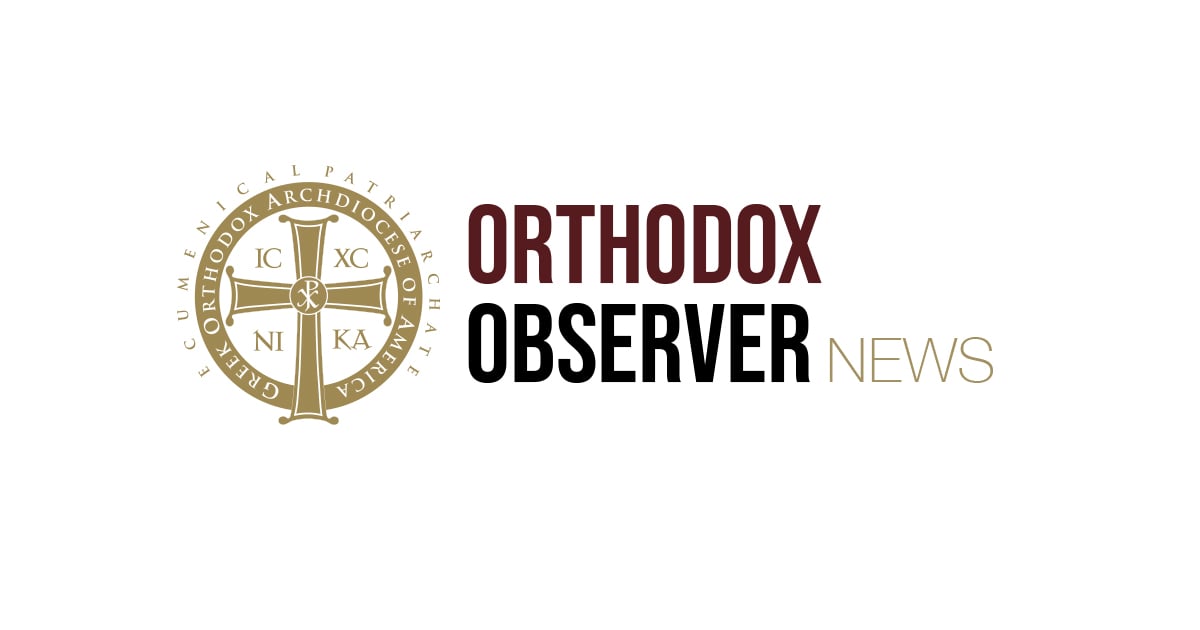His Eminence Archbishop Elpidophoros of America Homily at the Divine Liturgy on Christmas Eve
Holy Trinity Archdiocesan Cathedral
New York, New York
December 24, 2020
Christ is Born! Glorify Him!
I greet all of you this evening with these first words of Saint Gregory the Theologian’s Christmas Homily, preached over sixteen-hundred years ago![*] Four-hundred years later, this stunning praise inspired Saint Cosmas, the Bishop of Maiuma in Gaza, who was the adopted brother of Saint John of Damascus. They inspired him to write the Canon of the Feast of Christmas that we all know: Χριστὸς γεννᾶται, δοξάσατε!
We sing these hymns tonight and tomorrow in order to join with the Angels of Heaven, who appeared to the Shepherds in the Field and filled the night sky with the Hymn: Δόξα ἐν ὑψίστοις Θεῷ καὶ ἐπὶ γῆς εἰρήνη, ἐν ἀνθρώποις εὐδοκία.[†]
Is it not marvelous that before every Divine Liturgy, when we close the Orthros, the Doxology that includes the Celestial Hymn of the Angels is chanted? And why? Because every Divine Liturgy is an opportunity to give birth to Christ the Lord in our lives.
He was born in the most humble and poor circumstances of the world at His own Nativity. In a cave with beasts, for there was no room at the Inn … not much for a king.
Who ever heard of the birth of a king without servants, and guards, and attendants? But the Lord was born with the greatest servant of all, the handmaid of the Lord – His Holy Mother. He was born with an old man as his honor guard, but the aged Joseph was the ancestor of kings – David and Solomon – and he proved the most worthy guardian. And His attendants were the humble shepherds and the lowly animals, who bowed in wonder before Him! This is how Christ was born in Bethlehem of Judea. In humbleness and meekness, and this is how He is born within us, so that we may also bring Him forth in the world, by our thoughts, our words and our actions.
Just as Jesus was born in the most humble of circumstances, we also can bring Him forth in small and modest ways. We do not have to be rich or powerful to manifest God’s love in the world. We do not have to set up philanthropies and charities, or make supersized donations – even though if we are able to do so, it is a good and praiseworthy work.
All we have to do is to think and act with kindness, warm-heartedness, understanding, respect, humility, mercy, forgiveness and compassion toward others. All of these qualities are the characteristics of God’s love toward us, and they are marks of the sincerity and genuineness of our love for God, when we manifest them for our neighbor.
The cave in Bethlehem that the Lord shared with the beasts of the stable is an icon of the human heart. Inside each and every one of us is an untamed element, an instinctual reactivity that often strikes out against others. When we hurt or injure others in thought, word, or deed, it is because we are reacting out of our own pain. Like an animal, we are insensible to the pain of others, and so, we strike out. If it becomes a habit of self-protection, it really is soul-destroying and heart-numbing.
But when we welcome the Lord to our innermost selves – through His immeasurable love for us, and in the Holy Sacraments, He makes His home inside of us. As it says in the Gospel of John:
Καὶ ὁ Λόγος σὰρξ ἐγένετο καὶ ἐσκήνωσεν ἐν ἡμῖν…
And the Word became flesh, and made His dwelling among us. [‡]
And when He makes His home within us, He tames all the savage movements of our minds and hearts that lie just beneath our conscious awareness. We are not afraid of God, because who is afraid of a newborn baby? He comes ever so gently into our hearts. He does not spurn us if we are poor and destitute of virtue. His goodness nourishes us, just as He suckled at the breast of His Holy Mother. For our strongest advocate with the Lord is the Theotokos, who humbled herself to enter the cave. Remember, she was the daughter of rich parents, Joachim and Anna. But she was obedient to God – not out of fear, but out of wisdom and faith. She entered the cave to give birth, and in so doing, opened the gates of Paradise.
This is the profound and awesome mystery that we behold and venerate tonight. Illumined by the Star of Love and Peace, surrounded by the simplicity of that night in Bethlehem – a mother’s love, a guardian’s protection, the shepherds’ wonder, the Magi’s gifts – we, too, are called to enter into the cave of our hearts and discover the most precious gift that God has ever given the world, Incarnate Love.
May the miracle of the Lord’s Holy Nativity fill your hearts and minds with love for Him – the gentle Babe of Bethlehem – and may He grant unto us all a blessed Feast of Christmas, and a safe, prosperous and healthy New Year!
Χριστὸς γεννᾶται! Δοξάσατε!

